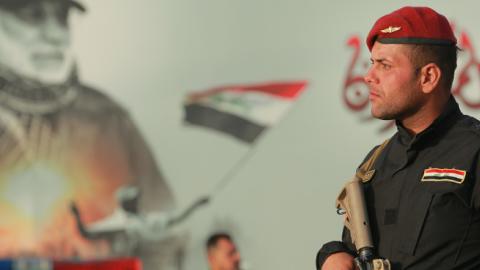While it struggles to constrain Iran-controlled militias it once welcomed to help defeat ISIS, Iraq now appears poised to make another policy blunder, drawing it further into Iran’s orbit. Iraq’s parliament is considering a new law that would effectively align it with its neighbor’s theocratic governance, undermine its fragile democracy and jeopardize religious freedom and other basic rights.
As early as September, Iraq’s parliament is to vote on a draft federal courts law that, for the first time, provides for mullahs to sit as judges on that nation’s highest court. Furthermore, it confers these Islamic judges with enhanced powers to veto laws they deem to be in conflict with Islam – laws passed by the duly elected parliament. These jurists would likely be drawn from Iraq’s dominant Twelvers branch of Shia Islam, which is also Iran’s ruling sect.
The bill’s second paragraph provides for four new supreme court seats for Islamic scholars to serve not as advisers but as judges with the exceptional power of veto to ensure a vague constitutional provision that “[n]o law may be enacted that contradicts the established provisions of Islam” (article 2). Iraq’s 2005 Constitution also stipulates parallel protections for democracy and citizens’ rights (article 2), asserting that “[t]he people are the source of authority” (article 5). But, the bill relies on another constitutional provision -- the “Federal Supreme Court shall be made up of a number of judges, experts in Islamic jurisprudence, and legal scholars,” (article 92) -- and makes no requirement for the Islamic jurists to be educated in civil law.
Iraq’s parliamentarians still must resolve who will appoint the Islamic judges and which sect of Islam they should represent. The Kurds want greater control over the appointments since jurisdiction would extend to the autonomous Kurdistan region. The religious blocs in parliament insist that a quorum for the Islamic judges be specified.
Such factors could mitigate but not eliminate the threats from having mullahs on the supreme court in the first place and, moreover, ones with greater powers than the other judges. They would be able to oppose, and even invalidate, religious freedom, women’s equality, the rest of the bill of rights, or the constitution itself.
Iraqi civic society activists, who met in Baghdad in June, expressed fears that the bill would turn the high court into a “supreme religious authority.” Iraq’s Christians, too, are alarmed and their leaders have lodged complaints with the U.S. and Iraqi governments, sources within that community told me.
Former MP and Christian politician Joseph Saliwa concludes that the draft would establish a “replica of the Islamic regime in Iran.” In a recent interview published in the outlet Baghdad Today, he stated:
“The formula now being considered in Iraq is imported directly from Iran, where the Expediency Council is responsible for appointing the Supreme Leader, who has absolute power to enforce the ‘Wali al-Faqih’ system [rule by the Islamic jurist].”
Writing in the Kurdish press, constitutional scholar Majida Sanaan-Guharzi agrees that this plan to pack the federal supreme court with empowered mullahs “resembles” Iran’s Guardian Council of the Constitution. She warns:
“[The draft law] could substantially alter the court's function, promoting an increasingly theocratic state wherein religious rules take precedence over the existing, mostly secular, legal system.”
Iraq’s constitution gives an opening for unelected men of the Shia religious elite to determine the course of the state. At the time of its drafting, American adviser for Iraq’s constitution Noah Feldman (now a Harvard law professor) was promoting the possibilities of synthesizing Islam and democracy, detailed in his 2003 book “After Jihad.” Certainly democracy can take root in Muslim-majority countries, as the Freedom House index shows has occurred in Senegal. But, as I wrote in the Washington Post 14 years ago, this opening for mullahs on the high court as judges with veto powers risks putting “Iraq’s judiciary in the company of those in Iran, Saudi Arabia, Afghanistan.”
Iran’s Islamic judges rig elections by invalidating candidates who fail their religious test. In Saudi Arabia, they ruled that democracy itself is “un-Islamic.” The first official act of the Afghan supreme court under a similar provision was to press blasphemy charges against the only female member of then-President Karzai’s cabinet after she criticized sharia rule. In all three countries, non-Muslims are persecuted.
The State Department may be tempted to shrug off such concerns in light of Iraq’s weak rule of law. This would be a mistake since such rulings can be enforced through sectarian manipulation, as seen with the blasphemy laws in Pakistan.
The U.S. continues to invest heavily in shoring up Iraq’s sovereign democracy. This month, it announced sanctions against abusive militia leaders and political figures in Iraq’s Nineveh province. The new American ambassador, Matthew Tueller, met with Iraq’s justice minister to pledge support for human rights protection and has visited leaders in Nineveh to report the U.S. commitment of over $340 million to rebuild communities and protect minority groups attacked by ISIS. These measures won’t succeed if Iraq follows Iran’s governing system of Islamic jurist rule.
The question is: Will U.S. diplomats find their voice to defend before a largely Muslim audience, democracy, religious freedom and other basic rights?

















